Brilliant and Bold Commentary Regarding People with Dementia Being Activists
Here is the brilliant and bold commentary regarding people with dementia being activists. I personally want to thank Eilon Caspi for submitting such a well thought out piece. This is something everyone concerned about dementia should read.
June 3, 2015
Commentary on Michael Ellenbogen’s Statement as Quoted in a Washington Post Article by Fredrick Kunkle on May 27, 2015: More people with Alzheimer’s are becoming activists – which brings its own challenges. The article can be accessed here: http://tinyurl.com/p87dz9e
During a recent meeting of the National Advisory Council on Alzheimer’s Research, Care and Services held on January 26 this year, a staffer read aloud Michael Ellenbogen’s statement:
“What do we need to do to get the attention of people like you? Will it take someone like me to have some sort of shootout like Columbine before someone will take notice? I would not do that but I am trying to get your attention, and I am failing and dying at the same time.”
This statement has led the Department of Health and Human Services (the federal agency that hosts the meetings of National Advisory Council on Alzheimer’s Research, Care and Services) to consider Michael a security threat and to ban him from its premises. In addition, the Alzheimer’s Association disassociated itself from him and told him that he could no longer speak for them.
Does Michael’s statement represent a serious problem and real threat? Or does it represent an opportunity to bring real change in the rights, perception, approach, care, quality of life, and dignity of millions of people living with dementia?
As a society, we have a choice here and my hope is that a serious dialogue will continue to be held about this complex ethical concern, and that it will be possible to carefully sort it out so that we’ll end up choosing the most constructive, dementia-friendly, responsible, safe, and humane option. The stakes are high.
Does these organizations’ response reflect a “dementia-friendly” and “person-directed” approach or more of a biomedical, psychiatric, pathology-oriented, and fear-based approach towards people living with dementia?
Does the response reflect the way our society relates to and treats these individuals? Is it a reflection of the persisting and harmful stigma widely-held about this population?
Should it be concerning that this response is coming from organizations that are supposed to have deep understanding of the lived experience of people with dementia?
Nobody should have to feel offended, threatened, or concerned for their safety by anyone’s remarks, including those made by people with dementia. With adequate and timely support, people in the earlier stages of dementia can and should take responsibility for their words and actions and, if they made other people feel threatened, they need to apologize and actively work hard (within their cognitive limitations and abilities) to find ways to avoid making such statements in the future.
I believe that several dementia-specific person-directed practice principles need to be taken into consideration in this case. These include:
One of the fundamental principles of communication with persons living with dementia is to listen to the underlying emotional message behind the words. Did these organizations truly follow this basic rule? This is not to suggest in any way that the statement should not be carefully and professionally evaluated (see below). Any real, implied, or perceived threat to the safety of people should be promptly and seriously reviewed and evaluated, no matter if the person expressing them has dementia or not.
A second principle is to get to know the life history of persons living with dementia in an in-depth manner. Doing so often helps understand the person and his verbal, non-verbal, and behavioral expressions in the present. Did anyone take the necessary time to learn about Michael’s remote and recent life history thoroughly and directly from him, his wife, his close friends, or from reading his heartbreaking and eye-opening book? The name of Michael’s book is From the Corner Office to Alzheimer’s Disease. For those interested, my review of Michael’s book is available on Alzheimer’s Speaks Blog using this link: http://tinyurl.com/qyz8k9c
Doing so, would enable to put Michael’s statement in a life-course perspective (e.g. How much he has done and sacrificed personally to improve the lives of thousands of other people living with dementia around the world; if Michael has explicitly expressed in the past that he is considering hurt someone, to my knowledge, it was in the context of ending his own life because of the worsening disabilities caused by his dementia and his wish not to become a burden on his family). Learning about Michael’s recent life-history would also enable to take into full consideration his unimaginable psychological suffering caused by the disease combined with the frustrations caused by lack of sufficient progress in developing (and adequately funding) psychosocial approaches (formerly called non-pharmacological approaches) to support and meet the human needs of people living with the disease and their care partners (family and paid). This, I believe, is likely the context for Michael’s statement.
A third principle is that many people with dementia may say things that they don’t intend and/or would not otherwise say if they were cognitively healthy (most would be mortified if they knew what they have said). Here I relate to problems with impulse control, disinhibitions, lower ability to regulate emotions such as strong frustration and anger, as well as reduced ability to anticipate the consequences of one’s statements.
If Michael would be willing, a compassionate whole-person interdisciplinary assessment could bring to the surface insights into his actual thinking process, cognitive disabilities and abilities, and his personal perception of the situation. Results of such assessment could inform the way this event could be perceived, revisited, and resolved.
Skilled experts should be able to sit with Michael as equals and assess his condition and thought process and determine whether he is truly considered a threat to others. I doubt it but given that the statement has already been made, perhaps this needs to be done to reassure the public and the organizations in question and others with which Michael collaborates that their safety is not under threat. If determined otherwise, then a humane and respectful approach should be considered and implemented to ensure the safety of people in these organizations and the general public.
Michael’s criminal record should be reviewed to rule out any possibility that he has made serious threats to harm others or has been violent in the past (before and after his dementia onset). Again, to reassure people who truly felt threatened for their or others’ safety, I believe that this needs to be done. Physically aggressive behavior and violent tendencies in people’s past often (though not always) predict similar behaviors in the future (whether one has dementia or not).
Some people with specific Dementias such as the behavioral variant of Fronton-Temporal Dementia, Korsakoff’s Syndrome, Chronic Traumatic Encephalopathy, among other forms of dementia, are more prone to and capable of inflicting serious harm to those around them. If not done very recently, an accurate diagnosis and assessment could and should be conducted with Michael. Even if he is diagnosed with one of those forms of dementia shown in the past to have higher probability of engaging in physically violent behaviors towards others, it still doesn’t necessarily mean that he, or other people with these conditions, will engage in violent behaviors towards others. Every person with dementia is unique and the actual impact of dementia on every person is different. Ongoing interdisciplinary individualized assessment is the key.
A fourth principle is that by far the most important asset we can have when we interact and care for persons living with dementia is developing close trusting relationships with them. This is hard to build and maintain and easily destroyed. Once you develop it, you are in a good position to truly understand the person and the underlying meaning of his/her verbal and non-verbal expressions. In this case, it could enable these and other organizations in interpreting Michael’s statement as a desperate call from an aching heart for a fundamental change in the way our society perceives, approaches, cares for, and treats these individuals. How many people from these organizations took the time and effort to develop and maintain this close trusting relationship with Michael?
I do know that a few people involved in the Advisory Council did try to assist Michael over the years to increase the likelihood that his messages in his speeches will be more receptive by and less offensive towards council members. I do not know the extent to which these efforts were successful in the past but clearly it wasn’t this time.
The fifth principle is that dementia is a disability (see Americans with Disability Act) but cognitive disability tends to be invisible. This creates the potentially dangerous illusion that persons living with dementia are fully capable of functioning as people with healthy brains. An experienced and skilled professional should have been assigned to review Michael’s transcript several days prior to the speech. It sounds as though his transcript was either not reviewed or not carefully reviewed. If it was, the statement would have been easily identified, brought to Michael’s attention, and, knowing him, he would have left it out and the ordeal would have been prevented.
Which leads me to the sixth principle. Preparation, preparation, preparation. Or being proactive, rather than reactive. Unfortunately, in the majority of interactions with people with dementia most people and organizations still use a reactive approach (i.e. the tendency to respond only after a problem occurs; nursing homes are a sad example of that but this is also very common at the home setting with burned out and unsupported family members and in the community in general). This approach is inconsistent with the Anticipatory Care Approach to people with dementia (coined by Prof. Christine Kovach).
Were the conditions for success proactively and thoughtfully created for Michael before his words were read at that meeting? The voice of people living with dementia is too precious to be left without gentle and attentive professional guidance (which must be done collaboratively in a true partnership with these individuals). Working with Michael on his transcript while preserving his key messages in a respectful way and at the same time alerting him for potentially problematic statements would have avoided the unfortunate event. Without downplaying the fact that Michael freely chose to use these words, it also begs the question of Did the staffer who read Michael’s statement during the meeting identified the problem prior to the meeting (i.e., during his/her preparation for the reading) and, if so, what did he/she do about it when he/she discovered it?
The seventh principle is that person-directed approaches to people living with dementia should be driven predominantly by focusing on their remaining abilities, not their disabilities. Their disabilities need to be proactively identified and compensated for in a timely manner. They need our help and support to function the best they can despite their limitations.
True “culture change” means being guided by hope, not fear. By opportunities for thriving and innovation, not life-limiting barriers used (too often) in the name of safety. Take the sad example of typical nursing homes, which focus excessively on safety and while doing so often deprive people with dementia of their right to adapted autonomy and life worth living. Again, this is not to suggest that safety of people should not be protected; it must but in a reasonable and wise way and always based on skilled, ongoing, and timely individual assessment.
Could it be that this event reflects blame the victim approach? Is Michael being blamed for using these words when there is a reasonable likelihood that the limitations caused by his dementia have contributed if not directly caused him to choose this statement? Michael himself acknowledged it. This approach is used frequently in all settings were people with dementia live and during daily interactions with them in the community.
Mourning the losses each step of the person’s journey with dementia and genuine acceptance of the changes that come along with it are critical for the ability to support them, understand them, work with them, and gain from their invaluable insights. These organizations know this principle well but did they truly walk the walk in this case? Nobody ever said that working with and caring for people with dementia is easy. It requires tremendous amount of empathy, patience, determination, and creativity.
Has Michael, whom I know to be a very compassionate, and empathic person, ever said anything of this nature to anyone around him…family members, friends, co-workers, neighbors? I doubt it, but this could and should be checked to reassure people that he doesn’t have these lifelong inclinations.
Michael’s words were read already
Michael’s words were read already, but it is worth restating that at the same sentence he was quoted saying that he won’t do it. Did this part of the sentence receive the appropriate weight in this discussion? Once a person with dementia is labeled “violent” or “security threat” we tend to stop seeing who the person really is and what caused him to say what he said. There is always a good reason and function behind verbal and behavioral expressions of persons with dementia. It is the job of people who come in contact with those living with dementia to decode and identify the reasons and fulfill their unmet human needs, which commonly underlie their verbal and behavioral expressions.
My remote reading of this incident is that it was a reflection of tremendous frustration accumulated over several years of Michael’s passionate, courageous, and determined advocacy work for (not against) the well being and safety of countless people living with dementia and those who care for them or otherwise interact with them in the community.
Michael’s dementia painfully progresses and, while he had numerous accomplishments in his advocacy work in recent years, he also experienced heartbreaking failures. Michael also copes with tremendous health challenges beyond his dementia. It is well known in the field that when people with dementia are under pressure (existential, health-related, and situational), they may say things that they would have not have said if they were cognitively healthy. As noted above, their frustration and anger threshold is lower than that of people without a serious brain disease. Looking at Michael (such as the picture published in the Washington Post article), it is very easy to forget that Alzheimer’s is a terminal disease.
Using an empathic approach to people living with dementia means doing everything we can to try and “step into their shoes” and strive to understand their lived experience. I believe that if the decision makers in the organizations in question would live a single 24-hour day in the shoes of people living with dementia, the whole case would either be prevented to begin with or approached differently after it occurred. We do it all the time with people with dementia. We assume things about them and then we (quickly) act upon these assumptions. My advice: Get to know Michael first as a whole human being, then his dementia, disabilities caused by it, as well as his remaining abilities (there are still many), and only then decide what would be the most reasonable course of action. If this has been thoroughly done, I take these last words back.
Michael has already apologized for his statement and should be released from the misery that this situation has brought him. While of course in no way I or anyone else should justify or support his statement, I think that it is important to recall and think about the main issue here: What did he actually try to accomplish on that day? Make people angry and feel threatened? Or improve the lives of people who struggle tremendously living with the disease in a society that does not provide adequate infrastructure to support them and their family and paid care partners?
If Michael needs additional and closer guidance in crafting his future speeches, this could be done without too much effort (I and I’m sure others will be willing to work with him on reviewing his future transcripts prior to his speeches). Ongoing, skilled, attentive, compassionate, and timely guidance could enable him to be successful in his advocacy work. Isn’t this what interacting and caring for people living with dementia is all about?
We have to remember that the true experts when it comes to the lived experience of dementia are people with dementia themselves.
They are the best teachers we have. Michael is not the only leading advocate when it comes to promoting the rights of people living with dementia. Good examples include Richard Taylor, Harry Urban, Robert Bowels, Kate Swaffer, and Sandy Halperin to name a few.
For Michael’s sake and for all other current and future leading advocates living with dementia who dedicate their lives for this human rights and public health issue, I believe that a serious reflection and discussion needs to be held to ensure that we do not fall into the trap of inadvertently being driven by the widely-held stigma and fear in our society about people living with dementia.
I believe that the voices of millions of people with dementia around the world, which are not heard due to their brain disease, can and should continue to be heard through Michael’s courageous voice and vision for a dementia-friendly society, as long as he still can…
In Michael’s words, “Never give up with your dreams, and drive forward until the end. You can still make a difference. Try to advocate for the ones who cannot, because we will be them one day.”
Would discontinuing collaborations with Michael end up doing disservice to a large and growing number of people with dementia who are no longer capable of advocating for themselves?
Let it be a story of hope, not fear. Of responsible compassion. Of true human connection and inclusion, not exclusion. Of true learning, not labeling. Of innovation, creativity, and progress. Of deep appreciation of what it means to be human and the importance of being interdependent on each other.
In the words of the late Prof. Tom Kitwood, author of the groundbreaking book, Dementia Reconsidered: The Person Comes First, “People with dementia may have something to teach the rest of human kind. If we make the venture one of genuine and open engagement, we will learn a great deal about ourselves.”
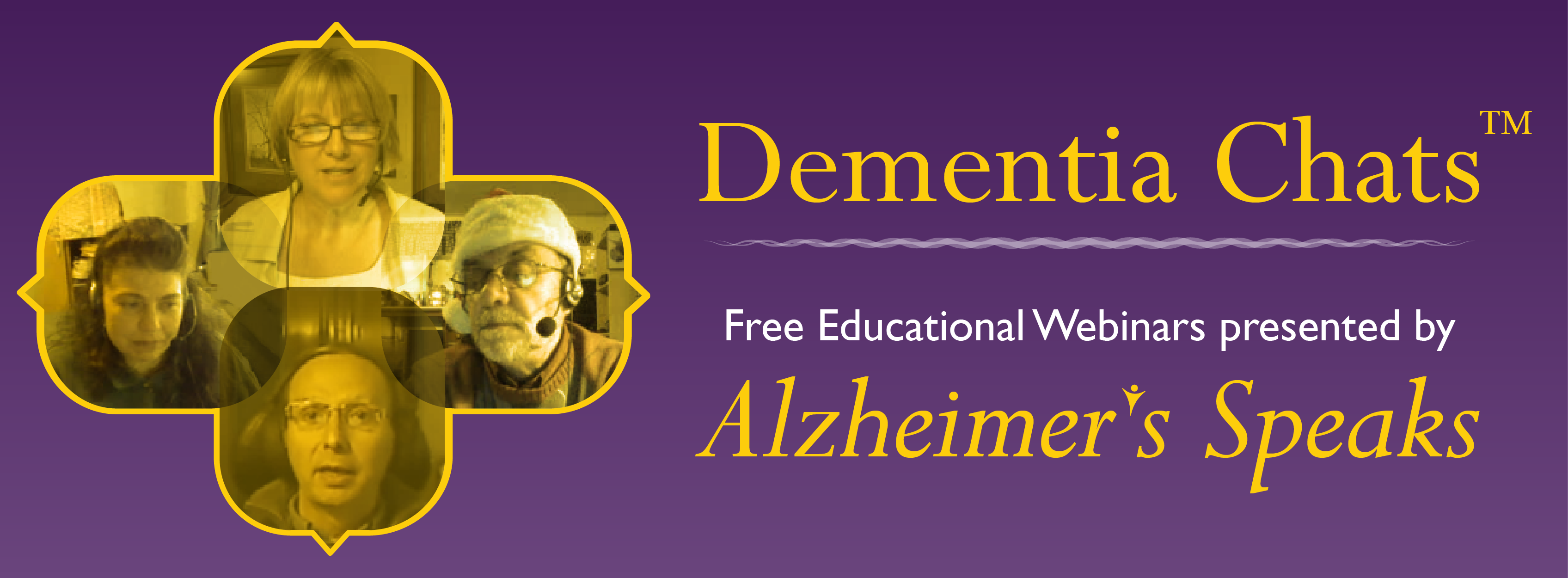 Disclosure: The author of this article have known Michael for over 2 years primarily from volunteering with him on the Dementia Chats webinar platform of Alzheimer’s Speaks (founder, Lori La Bey). The author did not attend any of the aforementioned Advisory Meetings.
Disclosure: The author of this article have known Michael for over 2 years primarily from volunteering with him on the Dementia Chats webinar platform of Alzheimer’s Speaks (founder, Lori La Bey). The author did not attend any of the aforementioned Advisory Meetings.
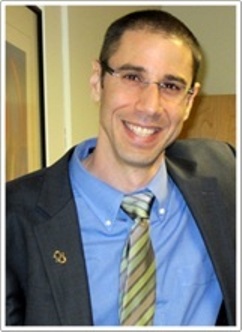 Eilon Caspi Ph.D., Gerontologist & Dementia Behavior Specialist
Eilon Caspi Ph.D., Gerontologist & Dementia Behavior Specialist
Author of the upcoming book: The Guidebook for Prevention of Resident-to-Resident aggression in Dementia. Health Professions Press.
Website: http://eiloncaspi.com
Archival Blog on Resident-to-Resident Aggression in Dementia: http://eiloncaspiabbr.tumblr.com
You could make a difference for your loved one with Alzheimer’s.
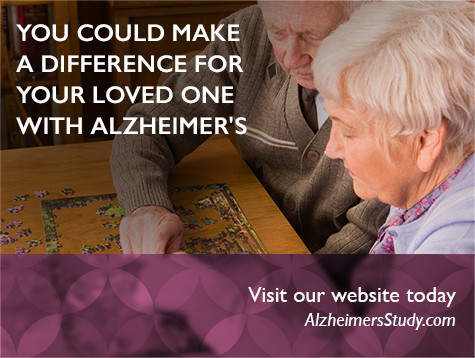 Click above and visit our website today.
Click above and visit our website today.
Become A Purple Angel!
Click Below
Looking For More Resources on Dementia and Caregiving?
Click Below


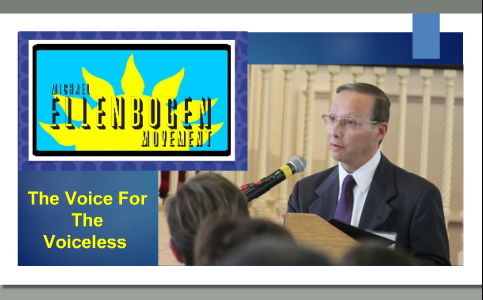
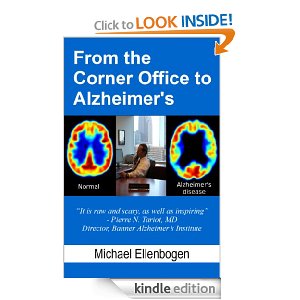

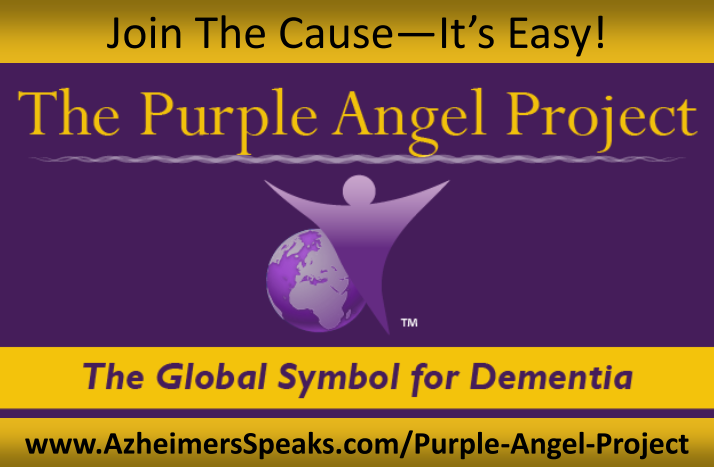
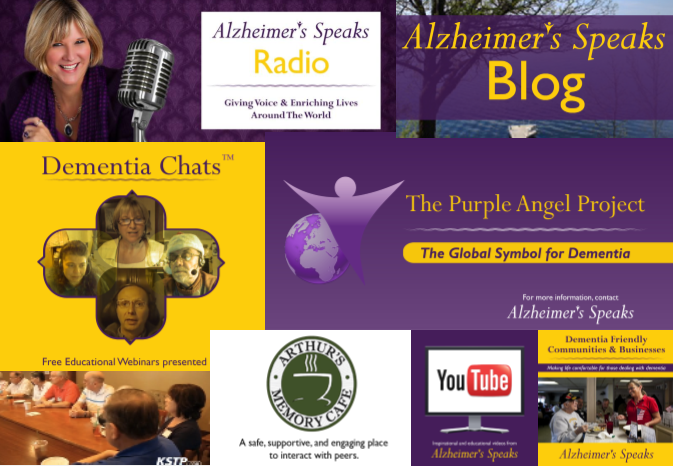
Very disturbing comments made by Michael, no matter how they are placed into context. I admire the expert analysis but any “speaker” with dimentis should have a professional handler (for lack of a better term) on hand in public venues. They must preface the speaker and make sure they stick to a script. My mother in law died from dementia and one minute she was lucid and then out of the blue… Well you all know how it goes.
HI Mark
I thank you for your comment. Here on Alzheimer’s Speaks we respect all opinions. Personally, the think whats scares me in your comment is the word “Script,” as some of these “handlers” have their own agendas and then we don’t get to hear what the true needs are as seen and felt by the person with dementia.
I also wonder in this case, if someone without dementia would have made that statement would the same reaction been had, given in the very next sentence it was made clear they wouldn’t do that, but were using it as an example.
There are no easy answers here other than I think we all have to dig deeper for answers and give more thought to our reactions when dealing with someone with dementia, realizing the old rules don’t work anymore. Each person with dementia is so different and it is important to have a good sense of who they are not only today but yesterday.
Thank you for writing. Lori
I don’t see how Michael’s statements could be construed as a threat by someone who is reading them in a conscientious way. Would it have made a difference if someone without Alzheimers had said,
“What do we need to do to get the attention of people like you? So many people with Alzheimers are trying desperately to get the attention of people like you to listen. Will it take one of them to have some sort of shootout like Columbine before someone will take notice? I don’t know of anyone who would even think of doing such a thing, but pray tell, what will it take to get your attention?
Would a statement such as that have been construed as a threat? What exactly is it about Michael’s statement that provokes the fear or threat?